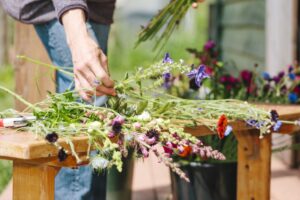 Foraging. The idea of living off the land in a remote cottage in the woods comes to mind when people hear this word. However, those with expansive properties are not the only people who can participate in foraging. Both the cities and the suburbs are wonderful places for foraging! This article explains what urban and suburban foraging is, if it’s legal, and how to practice foraging in your own area.
Foraging. The idea of living off the land in a remote cottage in the woods comes to mind when people hear this word. However, those with expansive properties are not the only people who can participate in foraging. Both the cities and the suburbs are wonderful places for foraging! This article explains what urban and suburban foraging is, if it’s legal, and how to practice foraging in your own area.
What is Urban Foraging?
Harvesting wild plants and mushrooms that are naturally found in your area is known as urban foraging or city foraging. A large number of these plants can be utilized to manufacture teas, medicines, or foods. For instance, the acorns growing from the trees along the city could be roasted or ground into flour, and the growing dandelions could be eaten.
Young TikTok influencers and viewers are becoming more and more interested in foraging. Tens of millions of people have viewed foraging videos on social media, and many internet users have adopted the practice to add to their diet. After all, why not? Foraging is a great method to learn about nature and become more familiar with the world around you. Also, you may be able to bring home wild crops that haven’t been sprayed with pesticides or chemicals.
Is Urban Foraging Legal?
On most public lands, it is lawful to take fruits, wild mushrooms, nuts, and plants. Among suburban and urban environments, this usually extends to the grounds around the city buildings, parks, sidewalks and walkways, creeks and riverbanks, and other accessible areas. To find foraging locations in your neighborhood, you may also use maps like the one offered by FallingFruit.org. You should, however, always double-check your local laws and land records. Some locations may restrict or prohibit certain foraging activities.
Moreover, it’s essential to respect the property owner’s rights and avoid trespassing on their land. If you first ask the owner of the property, some people might let you take fruit, nuts, and other foods from there. You may learn that your neighbors and other nearby property owners are prepared to give away excess produce.
How to Get Started
Foraging in cities may be a fun and rewarding activity. To begin, you should investigate what plants are indigenous to your region. You could do this online or by speaking with local gardeners, foragers, or botanists. To understand more about the plants you are likely to find in your area of the woods, you might want to think about enrolling in a plant identification course or joining a nearby outdoor club.
It’s vital to employ ethical techniques for harvesting while out exploring that show respect for the surrounding area and future land users. Don’t take more than necessary for yourself, unless it is given to you for free and you intend to share it with others.
Start investing in some basic foraging tools such as a paper bag (for mushrooms, since plastic can make them slimy), some compact containers to keep your found plants apart and prevent them from getting crushed, a small knife or pruning shears, and a basket or reusable bag.
Last but not least, take care to stay away from harvesting in regions that have been treated with chemical fertilizers or pesticides. For example, farm fields, factories, orchards and other sources of runoff agriculture, as well as regions near heavy car traffic are contaminated with chemicals. This also applies to golf courses or lawns that go through treatments with pesticides. Inquire of the owner or the local authorities if you are not certain if the area you wish to forage has been treated. Remember to thoroughly wash your foraged foods as a precaution, and safely prepare them before eating.
Foraging can be a great way to engage with the environment, discover more about local plants, and even get free food! After learning where to start, you can forage in the city or suburb. You’ll never know, there may be a forager’s paradise waiting in your backyard!
Are you transferring soon? See quality rental listings throughout your location by contacting your local Real Property Management!
We are pledged to the letter and spirit of U.S. policy for the achievement of equal housing opportunity throughout the Nation. See Equal Housing Opportunity Statement for more information.


